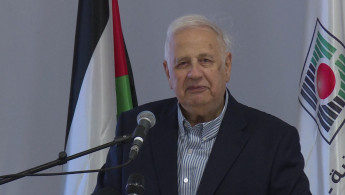Palestinian elections expose division crisis between Fatah and Hamas
Palestinians in the occupied West Bank voted in municipal elections on Saturday, underscoring deep rifts between President Mahmoud Abbas' Fatah party and rival Hamas which runs the Gaza Strip.
The West Bank and Gaza have not participated in an election together since 2006, when Hamas swept Palestinian parliamentary polls, sparking a conflict that led to near civil war in Gaza the following year.
Voting for around 300 municipal councils opened at 7:00 am (0400 GMT) on Saturday at dozens of schools across the West Bank, which has been occupied by Israel for half a century. Polls are due to close at 7:00 pm.
"It's important that everyone has a say," but also that those elected "assume the responsibility given to them", said Rami Nazal, a UN employee who voted in Ramallah, the seat of the Palestinian Authority.
More than a million Palestinians were registered to choose from among 4,400 candidates standing in a vote that is seen as yet another sign that reconciliation may be a long way off.
Even so, "municipal elections are better than nothing" in a country where "the situation is unlike anywhere else in the world," said Zina Masri, who voted before going to work.
Deep rifts
Meanwhile, Fatah accused Hamas of creating divisions within the Palestinian community after Hamas decided to boycott the local elections, despite agreeing last year to hold the municipal elections in the West Bank.
The elections were first announced in 2016, but judicial interventions by both parties in Gaza and the West Bank continued to block announced dates, postponing the elections.
| Read more: Palestinian protesters demand Abbas resignation amid election boycott calls |
Both Hamas and Fatah are accusing each other of perpetuating divisions with the elections.
Hamas has rejected the calls for elections saying they will only continue to pull political sensitivities in Palestinian socio-political hemisphere if elections are held before political reconciliation between the two parties.
"The election decision serves only Fatah, and it will never serve the Palestinian democracy," says Hamas spokesperson Fawzi Barhoum.
Fatah are accusing Hamas of undermining the Palestinian democratic process and stifling democracy by refusing to hold elections in Gaza.
| Read also: Analysis: Palestine's local elections: A one horse race? |
Other Palestinian political factions have also decided to boycott the elections. Palestinian communist party, Popular Front for the Liberation of Palestine (PFLP), have also refused to participate.
The PFLP announced in March that it will suspend participation in the local elections in protest of PA police violent repression of protests.
This came after Palestinian revolutionary writer and activist Bassel al-Arraj was killed when Israeli forces raided his home and killed him on March 6.
Many Palestinians, including the PFLP group had openly voiced their suspicions that the PA was complicit in coordinating with Israel to assassinate Arraj.
Third set of elections since Oslo
The elections are the third local elections to take place in Palestine since the Oslo agreement.
They also come more than 10 years after Hamas won the majority of seats in the parliament, which left the international community to deal with the implications of a Palestinian nationalist and Islamist movement finding its feet within the mainstream Palestinian political machine.
The 2006 elections saw a relatively high turnout rate, which sat at 77.6 percent and gave Hamas 74 out of 132 seats in the Palestinian parliament.
Abbas, whose term was meant to end in 2009 but who has remained in office, has grown unpopular among Palestinians, but he remains their leader in the eyes of the world.
He met US President Donald Trump in Washington on May 4 and is expected to do so again when Trump travels to the Middle East later this month.
Hamas meanwhile is considered a terrorist group by Israel and much of the West despite recent attempts by the movement to soften its image.




 Follow the Middle East's top stories in English at The New Arab on Google News
Follow the Middle East's top stories in English at The New Arab on Google News

![A group of Palestinians, foreign and Israeli activists gather to participated in an olive picking event on the land in the town of Battir, which is under threat of confiscation by Israel in Bethlehem, occupied West Bank on 8 November 2024. [Getty]](/sites/default/files/styles/image_330x185/public/2182930803.jpeg?h=199d8c1f&itok=__0LgGsa)
